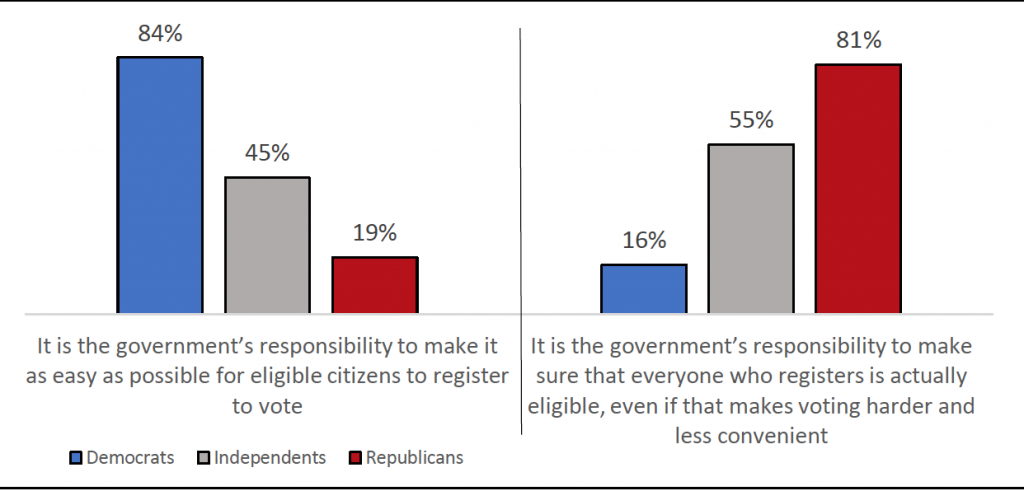Democrats and Republicans are divided in what they believe the government’s main role should be in the election process—making it as easy as possible for eligible citizens or making sure everyone is eligible even if makes voting harder.

Read the full report
Key findings
- Nearly three-quarters of Americans favor allowing people convicted of felonies to vote after serving their sentences; support is particularly strong among Black Americans and Democrats.
- While a majority of Republican either strongly or somewhat support this policy (54%), unlike any other group in our analysis a higher proportion of Republicans strongly oppose than strongly support the enfranchisement of former felons.
- Americans are split on whether people should be removed from registration lists if they have not recently voted or confirmed their registration.
- The policy is partisan, with four in five Democrats opposing this type of voter roll purging, whereas the same proportion of Republicans favor the policy.
- 83% of American adults favor ensuring the eligibility of those listed on voter rolls through allowing states to cooperate on a national database that checks whether potential voters have moved or have duplicate registrations
- 90% of American adults favor using information from the Social Security Administration and death certificates to remove those who are no longer living from registered voter lists.
- Two-thirds of Americans support requiring all voters to show government-issued identification to vote.
- Voter ID requirements are favored by a majority of group that we assessed, except for Democrats, who are split on the issue.
- A slight majority prioritizes the government’s role in making it as easy as possible for citizens to register to vote over ensuring voter eligibility.
- Black Americans stand out as a demographic group that favor ensuring the ease of voting over voter eligibility, by a margin of 74% to 26%.
- More than 83% of Democrats prioritize emphasizing the ease of voting, while more than 81% of Republicans favor ensuring voter eligibility.
- When those who prioritize ease of voting are asked to explain their reasoning, far and away the most common type of response given has to do with guaranteeing the right to vote. Responses include the following:
- Voting is the foundation of our country. Anything less risks privilege and bigotry”
- “It is our constitutional right to vote.”
- “I think voter suppression is a greater issue than voter fraud or inaccuracies. I also think this could help increase the amount of voters for elections.”
- When those who prioritize ensuring voter eligibility are asked to explain their reasoning, the most common key words are fraud and legal or illegal. Examples of the responses include:
- To prevent voter fraud; to prevent people from voting twice in different jurisdictions; to prevent fake ballots from contaminating and diluting the votes of actual qualified citizen voters.”
- “Voting is a privilege, not a right. It would be in the government’s best interest to make sure voters are eligible.”
- Because illegal aliens should NOT be able to vote.”